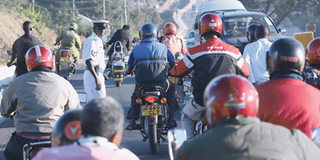How road safety can help improve the economy

What you need to know:
Those instructions were reiterated by the Head of Police Traffic Department, Mr. Fortunatus Musilimu, thus making them a nation-wide appeal. If these instructions are adhered to, we can expect improvement in road safety and even in the overall economy of Tanzania.
A few days ago, Mwananchi reported about instructions given to traffic police by the Dar-es-Salaam Special Zone Police Commander, Mr Lazaro Mambosasa. Mambosasa called on traffic officers to refrain from stopping motorists without probable cause and focus on those who violate traffic rules.
Those instructions were reiterated by the Head of Police Traffic Department, Mr. Fortunatus Musilimu, thus making them a nation-wide appeal. If these instructions are adhered to, we can expect improvement in road safety and even in the overall economy of Tanzania.
Mambosasa has touched on an issue that has been the main complaint of motorists for many years – random stops by police for no apparent reason. In many countries, it is unlawful for the police to stop vehicles without probable cause or a reasonable suspicion that the motorist is violating some law. Evidence obtained by police officers through random stops can be rejected. It is not unusual, therefore, in some countries, for one to drive regularly, from the driving age until old age, without ever being stopped by the police.
In East Africa, traffic officers have been stopping vehicles without any probable cause whatsoever.
They then ostensibly conduct a vehicle inspection, often times also soliciting a bribe from the driver. This can take place while they are totally oblivious to the most blatant and dangerous traffic violations occurring before their very eyes.
There are already enough traffic violations to keep traffic police fully occupied. In fact, one could argue that Tanzania does not even have enough officers to deal with the current level of traffic violations seen everywhere. Focusing on those violations such as speeding, disregarding traffic signs, failing to yield to pedestrians in zebra crossings (crosswalks), driving on the shoulder of the road, and overtaking another vehicle in a “no overtaking” zone would go a long way in reducing accidents. Random stops for the purpose of inspection are a waste of public resources (police officers) and people’s time.
Random stops are part of the reason for the high transportation costs in Tanzania (and East Africa, in general).
Consumers and producers in all sectors are hurt, directly or indirectly, by unnecessary delays on the road. Surveys by the East African Business Council conducted a few years ago suggest that random vehicle inspections by police were among the most severe forms of non-tariff barriers within the East African Community.
Random stops by the police prolong time on the road and make it very difficult to plan ahead. They cause delays in arriving to work and in the deliveries of products and services. Imagine the cost incurred, for example, by someone transporting a perishable product and being stopped and inspected every few kilometers.
In 2014, The Economist reported that “[a]ccording to the East African Bribery Index 2013, a joint project between TI [Transparency International] and the East African Community (EAC), Tanzania’s police force is the most corrupt public institution in the region with an estimated bribery likelihood of 26 per cent.” Of course, not all police bribery involves traffic officers, but the arbitrariness of random vehicle inspections, creates an environment conducive for corruption.
Commanders Mambosasa and Musilimu’s appeal for traffic officers not to overstep their authority and focus on the drivers that violate traffic laws must be commended. If adhered to, these instructions will improve road safety, improve the economy, reduce corruption, and build relationships of mutual trust between traffic police and the public.
The traffic police are not the enemy and motorists are not automatic suspects by virtue of driving. At the same time, there are many drivers who violate traffic laws. Let the traffic police, with the support of the public, focus on them to keep the roads safe and help the economy prosper.
Richard E. Mshomba is Richard E. Mshomba is Professor of Economics, La Salle University, Philadelphia, Pennsylvania, U.S.A. ([email protected])




